1 - Expected post-Chinafy results
What is Baidu SEM and How Do I Get Started?
How can you unlock the potential of a market with over 1 billion internet users?
If your business is expanding into China or already targeting this massive market, Baidu SEM (Search Engine Marketing) is one way to boost your brand's visibility in the region.
Much like Google Ads for businesses targeting a global audience, one aspect of Baidu SEM involves creating targeted ad campaigns that capture user interest. But with its own unique processes and local regulations, navigating Baidu SEM requires a specialized approach.
TL;DR: Baidu SEM is an advertising solution that helps businesses reach Chinese audiences through paid ads on Baidu's search engine. It involves bidding for keywords, optimizing ads for the Chinese language, and complying with local regulations. Businesses should focus on localization, appropriate bidding strategies, and ongoing optimization to succeed with Baidu SEM.
What is Baidu SEM?
Baidu SEM (Search Engine Marketing) is the process of creating and managing paid advertisements that appear in Baidu search engine results. Businesses can place targeted ads based on keywords relevant to their products or services, helping them capture the attention of users actively searching for related information.
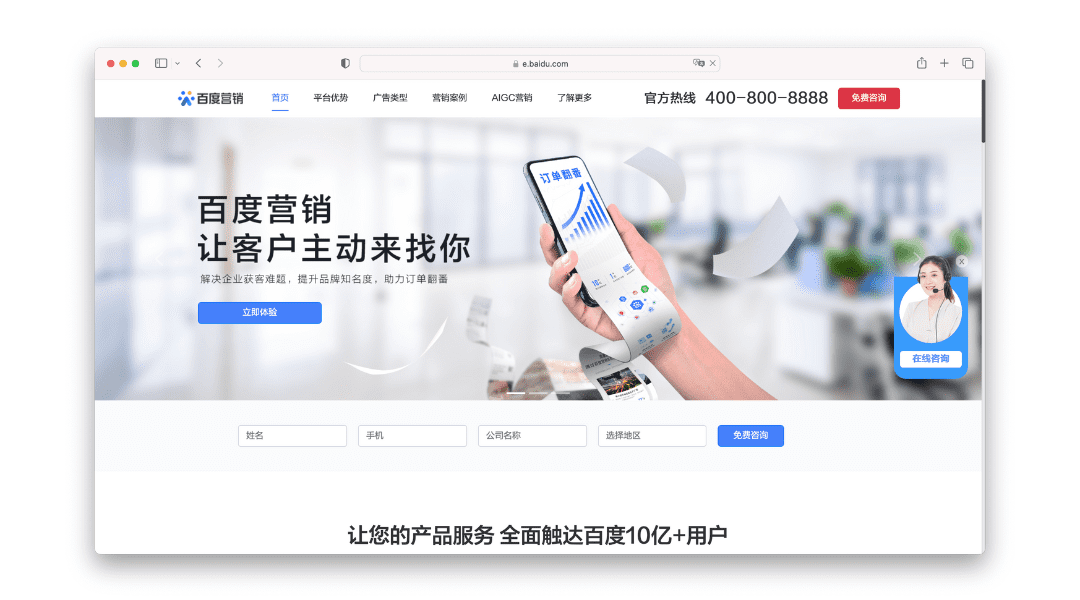
Baidu Advertising offers exposure to up to 100 million users. Source: Baidu (2024)
Similar to Google Ads, Baidu SEM works on a pay-per-click (PPC) model, where advertisers bid on specific keywords to get their ads placed prominently on search result pages. This enables companies to increase brand visibility, drive website traffic, and reach potential customers more effectively.
Given that Baidu dominates the Chinese search market, investing in Baidu SEM is a useful strategy for businesses looking to expand into China, especially since Google is not accessible in the country and other search engines hold only a minor share.
Key features of Baidu SEM
Keyword bidding: Baidu SEM operates on a bidding system where businesses bid on keywords relevant to their offerings. The higher the bid and the better the ad quality, the greater the chances of your ad appearing at the top of search results.
Ad formats: Baidu offers a variety of ad formats, including text ads, image ads, and even video ads. These formats can appear across search results, content networks, and Baidu’s partner sites, giving advertisers multiple opportunities to engage users.
Targeting options: Baidu provides various targeting features, including location targeting, device targeting (mobile or desktop), and interest-based targeting. This allows advertisers to define the right audience for their campaigns, increasing the likelihood of conversions.
Language localization: All ads need to be created in Simplified Chinese to effectively reach Chinese consumers. The ads also need to align with cultural nuances to improve engagement and avoid misunderstandings.
Account verification and compliance: Unlike Google Ads, Baidu requires advertisers to go through a verification process to ensure compliance with Chinese advertising regulations. This process includes submitting company documents and, in some cases, acquiring an ICP (Internet Content Provider) license.
Getting started with Baidu SEM
Here’s what you need to get started with advertising on Baidu:
1. Set up your Baidu PPC account
To create a Baidu PPC (Pay-per-click) account, businesses must meet certain prerequisites, including a business registration certificate and either a Chinese or overseas business license. This is to verify the legitimacy of the company and ensure compliance with China’s advertising regulations. Setting up an account also requires an initial payment, with additional fees that vary depending on the region.
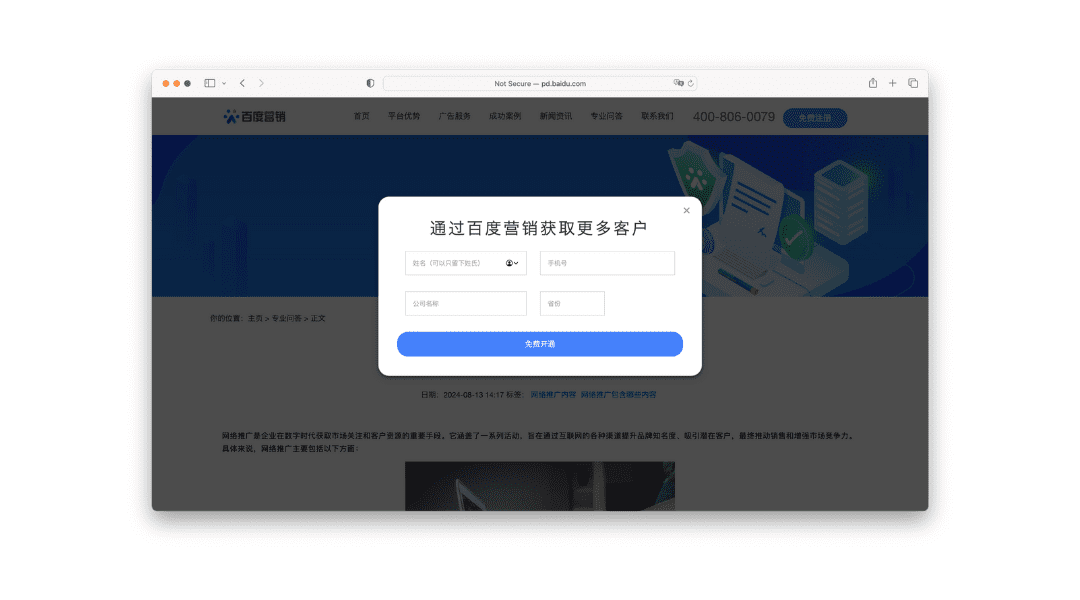
Baidu Ads accounts are free to sign up on e.baidu.com. Source: Baidu (2024)
2. Understand the advertising requirements
Baidu's advertising process involves submitting various documents to verify your business, including a valid business registration certificate. Additionally, companies must comply with strict content regulations, as Baidu enforces rules on what can and cannot be advertised. For example, ads in sensitive categories like healthcare and pharmaceuticals have more stringent limitations.
Content restrictions also include avoiding certain words and symbols, as well as political content that might be considered controversial. Working with a local partner can help navigate compliance challenges and ensure a smooth campaign launch.
3. Localize your ad copy
One of the biggest challenges in advertising with Baidu is ensuring your content resonates with the local audience. Unlike platforms like Google Ads, where ads are typically translated to reach international audiences, Baidu SEM campaigns require ads written in Simplified Chinese. Merely translating your existing Google Ads won’t cut it; your copy needs to be specifically adapted to resonate with Chinese users, which means understanding cultural nuances and current trends.
Aggressive special offers are commonly used in Baidu PPC ads and can be highly effective in capturing user attention. When crafting your ad copy, remember that Baidu allows two lines of text, though often only one line is displayed. Therefore, it's important to make your key message concise and impactful.
4. Optimize your landing pages
Creating localized landing pages that are specifically tailored for Chinese consumers is crucial for maximizing conversions. These pages should be in Simplified Chinese and optimized for site speed and functionality in China. Optimizing your landing pages for local relevance, including culturally appropriate images and messaging, can significantly improve user engagement.
5. Set your bidding strategy and monitor campaigns closely
Baidu PPC operates primarily on a pay-per-click model, similar to Google Ads, but requires close monitoring due to fluctuating keyword bidding prices. Keyword costs can vary significantly, so it's important to adjust bids regularly to stay competitive. Baidu’s Editor Tool, available in both Mandarin and English, can help manage campaigns and adjust bids in real-time.
6. Use Baidu’s advertising platforms
Baidu offers several types of paid advertising options, including:
ProTheme Ads: Ads that are contextually placed on relevant web pages.
Pay for Placement (P4P): Ads that appear prominently in search results based on keyword bidding.
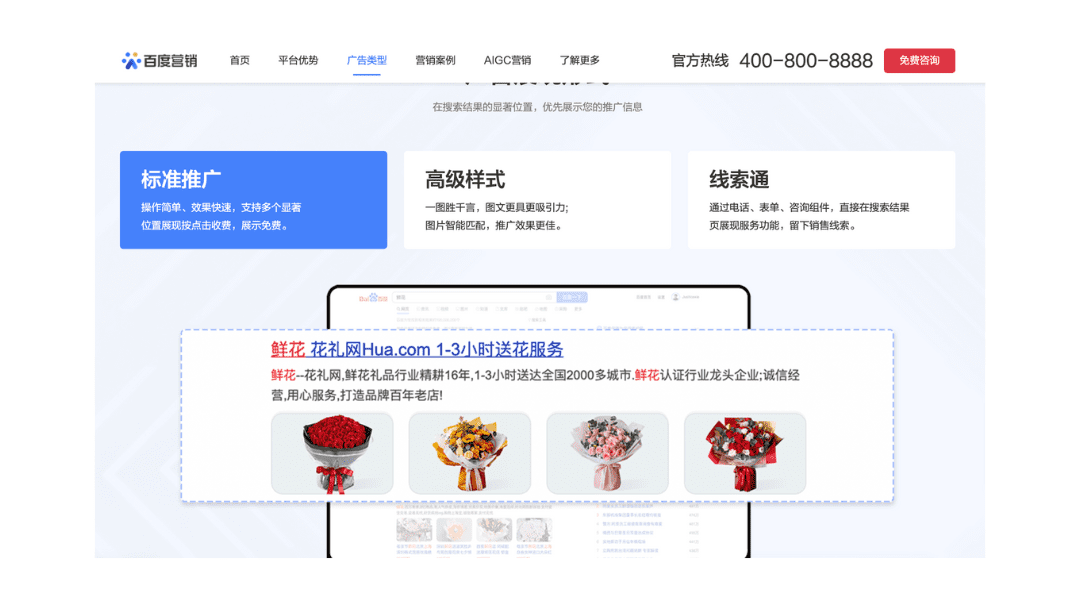
Target searches return the ads on the Baidu search result page. Source: Baidu (2024)
Baidu TV Ads: Video advertisements that run on Baidu’s network.
Information Feed Ads: Ads that blend into content feeds, similar to social media ads.
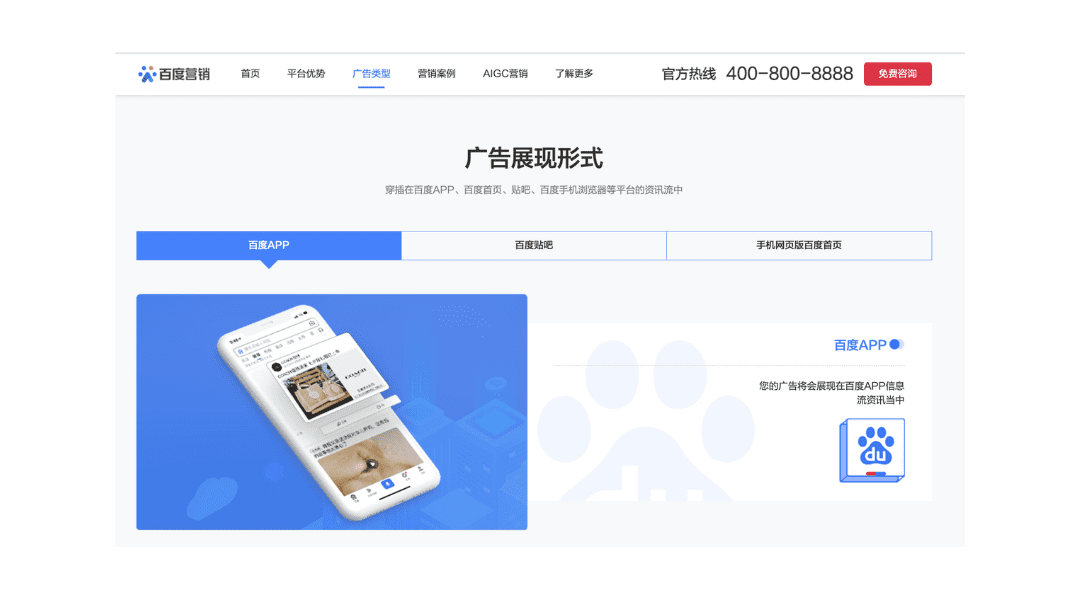
Information Feed ads are displayed on Baidu Apps or Baidu Tieba. Source: Baidu (2024)
Brand Zone: A premium ad product that allows businesses to dominate the search results page for branded searches.
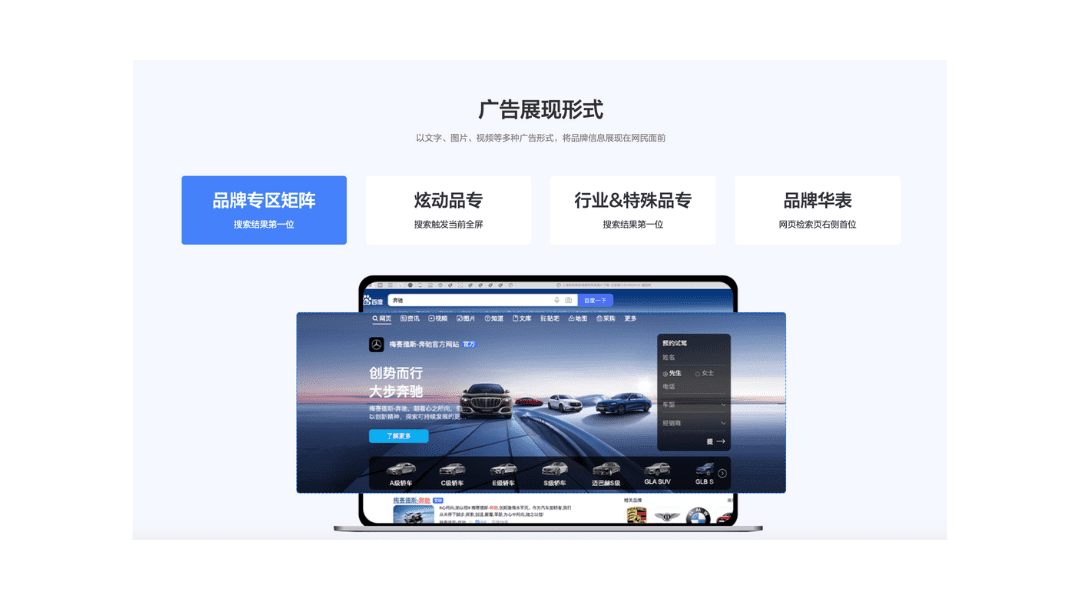
Mercedes-Benz uses Baidu Brand Zone ads. Source: Baidu (2024)
7. Leverage Baidu tools for campaign management
Baidu provides tools like Baidu Tuigang (百度推广) and Baidu Fengchao (百度凤巢), which are similar to Google Ads and Google Keyword Planner. These tools allow advertisers to plan and manage their campaigns, monitor performance, and make adjustments as needed. It’s also essential to track channels and analyze data for campaign success, as well as to watch for click fraud, which can be prevalent in the Chinese digital advertising space.
8. Combine PPC with SEO
While Baidu PPC is effective for driving immediate traffic, combining it with a long-term SEO strategy can yield the best results. PPC can help generate initial visibility, while an SEO-focused approach helps build sustainable, organic traffic. Baidu's search algorithm tends to favor websites with higher spending levels initially, but sustained rankings are best achieved through high-quality content and backlinks.
Baidu SEM best practices
Ensure all your ad copy is tailored in Mandarin Chinese, using culturally relevant language and offers.
Set up your Baidu PPC account with the necessary licenses and business verifications, including a Chinese or overseas business license.
Closely monitor your keyword bidding strategy and ad performance due to frequent fluctuations in bidding prices.
Adapt your landing pages to ensure a localized experience for Chinese consumers, with fast load times and relevant content.
Use Baidu’s tools, such as Baidu Tuigang and Baidu Phoenix Nest, to manage, track, and optimize your campaigns effectively.
Regularly review ad copy to ensure compliance with Baidu’s content regulations, avoiding restricted words and symbols.
Monitor click-spend daily to tackle click fraud and optimize ROI.
Baidu SEM can directly connect your business with potential customers in China through paid search ads. The nuances of Baidu’s advertising ecosystem—from keyword bidding to compliance with local regulations—are key to running a successful campaign.
With the right tactics and synergy with your overarching China marketing strategy, Baidu SEM can drive significant traffic to your website and landing pages.
Ready to kickstart your Baidu SEM campaign? Chinafy can connect you with Baidu SEM experts and make your website load faster and fuller to strengthen your China marketing strategy. Get in touch today to learn more.



1 - Expected post-Chinafy results






























